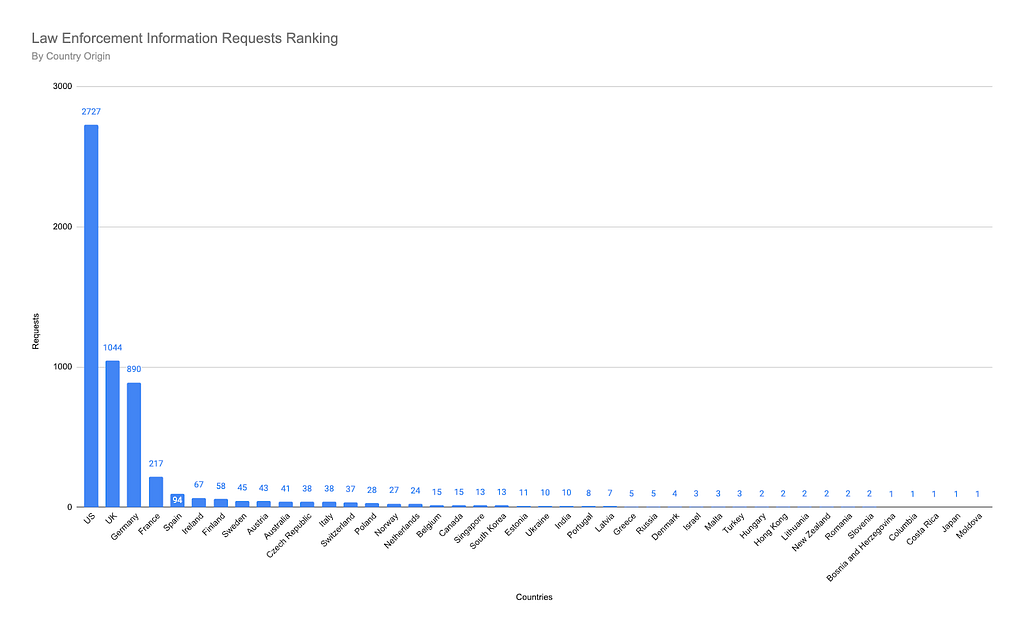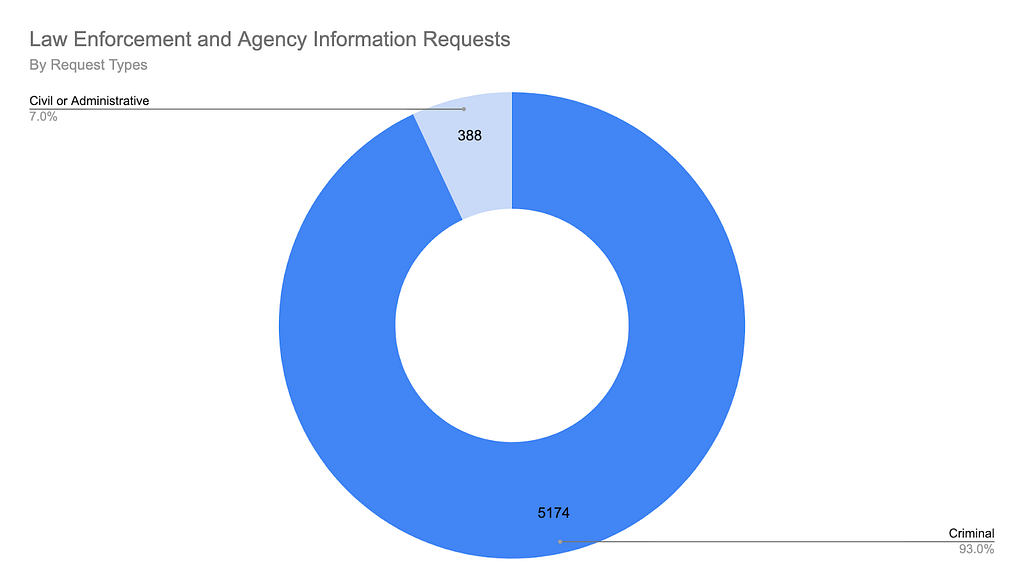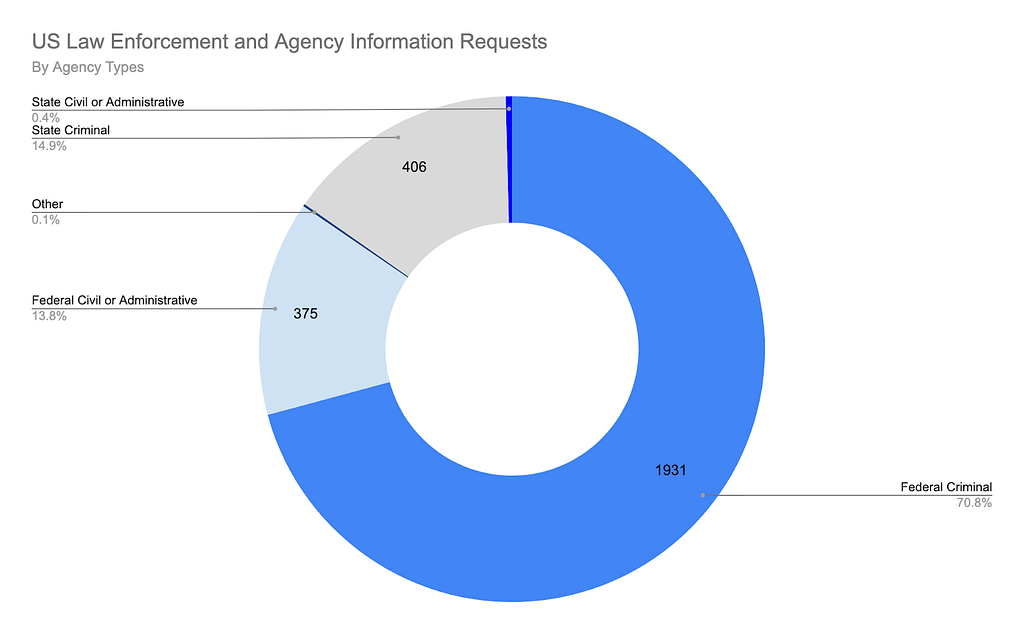Coinbase Transparency Report — — Q1-Q3, 2021
Coinbase Transparency Report -Q1-Q3, 2021
By Paul Grewal, Chief Legal Officer

Coinbase is proud to publish our third Transparency Report. This report covers the period between January 1 through September 30, 2021*. As Coinbase continues to grow and offer services in new markets, the number of legitimate information requests we receive from law enforcement agencies and other government agencies will increase accordingly. As such, moving forward, we will publish these reports on an annual basis.
The goal of these reports, which we began publishing in 2020 (our two prior reports can be found here and here), is to keep our customers informed about requests for customer information we receive from government agencies and law enforcement — how many we have received, where they come from, and our approach in responding to them. While transparency reports are common in the technology industry, we believe financial institutions should similarly publish these reports on a regular basis, and we encourage them to do so.
At Coinbase, the safety of our customers is very important to us, and we respect the key role of law enforcement and government agencies in pursuing bad actors who engage in prohibited activity or seek to abuse our platform. At the same time, protecting the financial privacy of our customers is a fundamental part of our commitment to being the most trusted place to engage with cryptocurrency. This report shares data on the requests for information that Coinbase receives from government and law enforcement agencies around the world and provides a view into how government policies and actions intersect with customer privacy.
Coinbase Transparency Report
Period: January 1, 2021 — Sept. 30, 2021
Coinbase currently serves more than 73 million customers worldwide. We regularly receive and respond to requests from law enforcement and government agencies seeking customer account information and financial records in connection with civil, criminal, or other investigative matters. These requests can include subpoenas, court orders, search warrants, or other forms of formal legal process. We have an obligation to respond to such requests if they are valid under financial regulations and other applicable laws.
Each request is carefully reviewed by a team of trained experts using established procedures to determine its legal sufficiency; where necessary, we will narrow or push back on requests that appear overly broad or vague. The charts below provide data on the number of requests that we have received and how we have responded to them, broken down by country. As we continue to enhance our processes, we will be publishing this report annually, subject to certain limitations.
Key Takeaways:
- There were a total of 5,562 requests in the first three quarters of 2021, and ~51% of requests came from outside of the United States.
- ~84% of requests are from the U.S., U.K., and Germany.
- Countries that sent requests for the first time in 2021 include Latvia, Greece, India, Turkey, Bosnia, Hungary, and Russia.
- The number of requests we received in the first three quarters of this year represents a ~27% increase from the total number of requests we received in all of 2020.




FAQs:
Does this report include data about requests received by all Coinbase entities/services?
This report includes data about requests related to our various products and services including coinbase.com, coinbase.com/exchange, coinbase.com/prime, and custody.coinbase.com.
What does it mean if my country is not listed on the report?
We only include countries where (i) our services are available, and/or (ii) Coinbase received a government or law enforcement request.
What is a government information request?
A variety of laws allow the government and law enforcement agencies of a given country to request the disclosure of customer information for civil, administrative, criminal, and national security purposes, including as part of an investigation.
What information does Coinbase provide in response to government and law enforcement requests?
Depending on the nature and scope of the request, Coinbase may produce certain customer information, such as name, recent login/logout IP address, and payment information; this type of information may be subject to requests by government and law enforcement agencies when a customer uses one of our applications or our website, as described in our privacy policy.
Before we consider disclosing information in response to a government or law enforcement request (such as a subpoena, court order, or similar legal process), we review each request on an individual basis. If we believe a request is over-broad or vague, we seek to narrow it and provide a more appropriately tailored response, and in some cases we object to producing any information at all (such as if the request is legally insufficient).
Does Coinbase challenge or reject government requests?
Coinbase may challenge government and law enforcement requests, depending on the particular circumstances of each request. Under certain circumstances, we may ask the government or law enforcement agency to narrow their request.
Who reviews government requests for user information at Coinbase?
Coinbase has a trained team of lawyers, analysts, and other experts who review and evaluate each government and law enforcement request individually to assess its legal sufficiency and determine an appropriate response.
Does Coinbase provide governments with direct access to customer information?
Coinbase does not give any government in any jurisdiction (including law enforcement, or other government agencies) direct access to customer information on our or any third-party’s systems.
###
* Data for the remainder of 2021 will be captured in our next report, to be published in 2022.
(2) Coinbase receives various criminal, civil and administrative requests from regulators and agencies in various countries seeking information about specific accounts and transactions. This Transparency Report reflects data related to these requests; it does not include customer initiated requests for information or productions required as part of routine regulatory examinations.
Coinbase Transparency Report — — Q1-Q3, 2021 was originally published in The Coinbase Blog on Medium, where people are continuing the conversation by highlighting and responding to this story.


